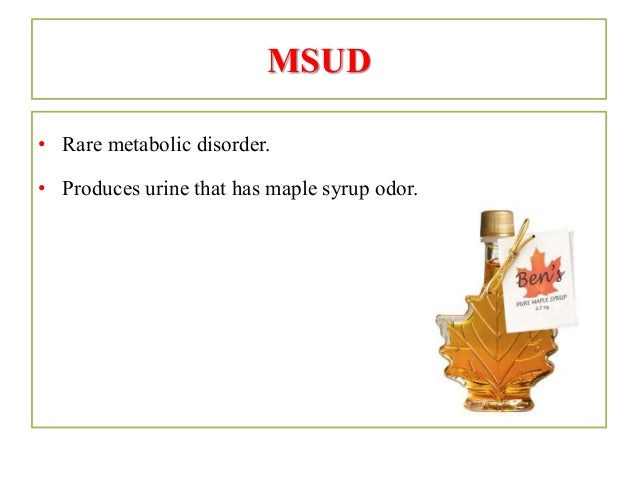
In the era of newborn screening (NBS), the prompt initiation of treatment of asymptomatic infants detected by NBS means that most individuals who would have developed neonatal manifestations of MSUD remain asymptomatic with continued treatment compliance. Individuals with intermediate MSUD have partial branched-chain alpha-ketoacid dehydrogenase deficiency that manifests only intermittently or responds to dietary thiamine therapy these individuals can experience severe metabolic intoxication and encephalopathy in the face of sufficient catabolic stress. Severe intoxication culminates in critical cerebral edema, coma, and central respiratory failure. Worsening encephalopathy manifests as lethargy, apnea, opisthotonos, and reflexive "fencing" or "bicycling" movements as the sweet maple syrup odor becomes apparent in urine Seven to ten days. Early and nonspecific signs of metabolic intoxication (i.e., irritability, hypersomnolence, anorexia) are accompanied by the presence of branched-chain alpha-ketoacids, acetoacetate, and beta-hydroxybutyrate in urine Four to six days. Maple syrup urine disease (MSUD) is a disorder of branch chain amino acids metabolism caused by a deficiency of branched-chain -keto acid dehydrogenase. Elevated concentrations of branched-chain amino acids (BCAAs leucine, isoleucine, and valine) and alloisoleucine, as well as a generalized disturbance of amino acid concentration ratios, are present in blood and the maple syrup odor can be detected in cerumen Two to three days. Neonates with classic MSUD are born asymptomatic but without treatment follow a predictable course: 12–24 hours. These cows have many of the same disease features as seen in human patients, and our lab has acquired these animals to help further describe the disease as well as develop treatments for MSUD.Maple syrup urine disease (MSUD) is categorized as classic (severe), intermediate, or intermittent.


Cow model of MSUDĪ cow model of MSUD was first reported in Indiana. as a progressive neurologic degenerative disorder. The Gray-Edwards lab is working closely with the Clinic for Special Children in Strasburg, Pennsylvania on this project. Maple syrup urine disease (MSUD) was first described in 1954 by Menkes et al. Ultimately, the quality of life of MSUD patients remains low and our goal in this lab is to develop a gene therapy that can help treat this devastating disease. Liver transplantation is a potential therapeutic strategy for MSUD but has major disadvantages, such as shortage of available organs, high inherent risks, and it does not alleviate behavioral/cognitive deficits. Maple syrup urine disease (MSUD) is a rare recessively inherited metabolic disorder causing accumulation of branched chain amino acids leading to neonatal death, if untreated. This scenario can potentially be prevented by careful dietary regulation consisting of BCAA-free diet, but it will not fully prevent MSUD crises (cerebral edema) nor development of behavioral and cognitive abnormalities like low IQ and psychiatric disorders. If not diagnosed immediately at birth, children will develop highly fatal cerebral edema (brain swelling) and subsequent coma in just a few days. Second-tier Maple Syrup Urine Disease and Phenylketonuria by LC-MS/MS (MSUD-PKUQC). Individuals with MSUD have poor feeding behaviors, lethargy, irritability, central respiratory failure, abnormal skeletal muscle function and neurological and cognitive abnormalities.

Due to mutations in one of these genes results in a dysfunctional protein that can no longer break down these BCAA’s and thus causes toxic accumulation in cells throughout the body.

This devastating disease is caused by a mutation in one of three genes, BCKDHA, BCKDHB and DBT, that forms a protein complex that breaks down large amino acids, branched-chain amino acids (BCAA’s) essential for life. This leads to a buildup of these chemicals in the blood. People with this condition cannot break down the amino acids leucine, isoleucine, and valine. It is caused by a defect in 1 of 3 genes. Maple Syrup Urine Disease (MSUD) is a recessive metabolism disorder that causessevere neurological symptoms and causes fatal swelling of the brain in infants. Maple syrup urine disease (MSUD) is inherited, which means it is passed down through families.


 0 kommentar(er)
0 kommentar(er)
